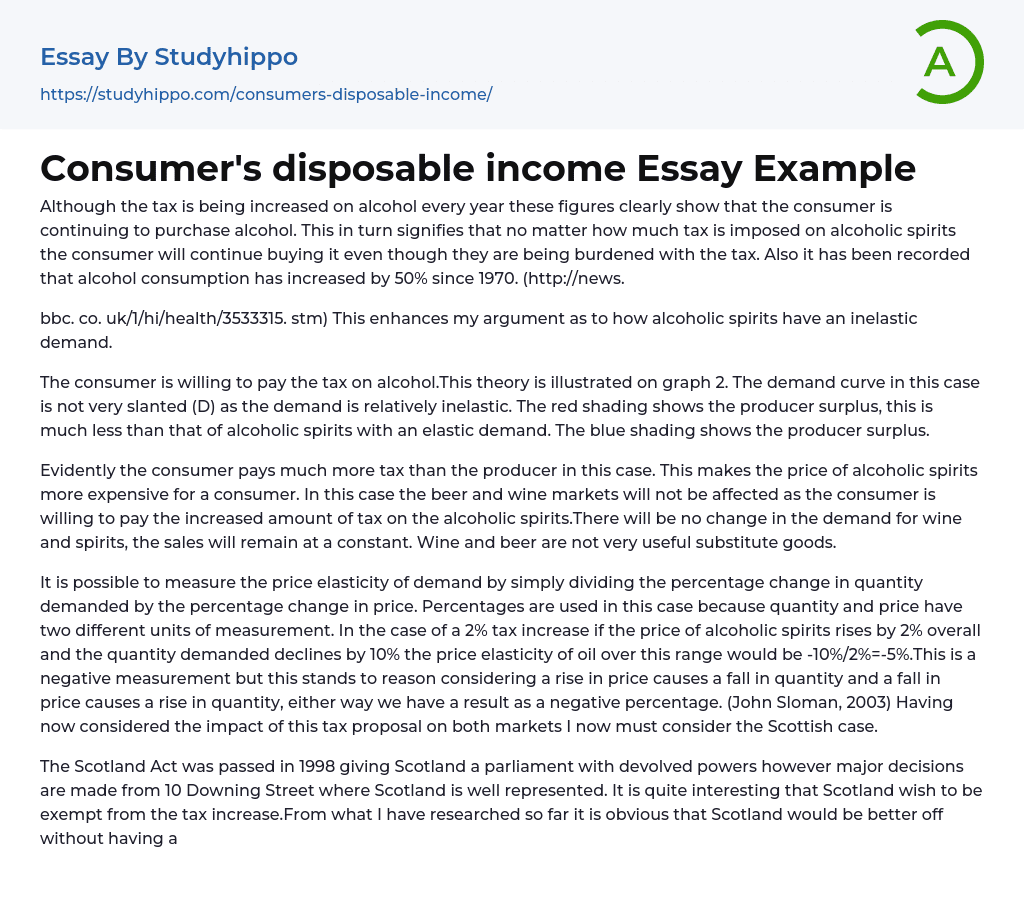Although the alcohol tax increases every year, consumers still consistently buy it, which shows that they continue to demand alcoholic beverages despite the additional financial strain. This is also evidenced by a 50% increase in alcohol consumption since 1970. (http://news.)
The website bbc.co.uk/1/hi/health/3533315.stm supports my argument concerning the inelastic demand for alcoholic spirits.
Graph 2 illustrates the theory that consumers are willing to pay the tax imposed on alcohol. The demand curve (D) is not steep as the demand is less elastic. The producer surplus is represented by red shading, which is lower compared to that of elastic alcoholic spirits. The blue shading shows the producer surplus.
Although the tax burden is greater for consumers than producers, causing higher prices for alcoholic spirits, it does not impact beer and wine markets becaus
...e consumers are willing to pay the increased tax. Wine and spirits maintain a constant demand as they cannot be easily replaced by other goods.
When determining price elasticity of demand, the percentage change in quantity demanded is divided by the percentage change in price. This is done because quantity and price have different units of measurement. For example, if there is a 2% tax increase and the price of alcoholic spirits increases by 2%, resulting in a decrease in quantity demanded by 10%, then the price elasticity of oil would be -10%/2%=-5%. A negative measurement is expected because an increase in price leads to a decrease in quantity and vice versa (John Sloman, 2003). After analyzing how this tax proposal affects both markets, the next step involves examining its impact on the Scottish market.
The Scotland Act of 1998 established a parliament with devolved power
for Scotland. Despite this, important decisions affecting Scotland are made from 10 Downing Street where it is well represented. It is worth noting that Scotland aims to avoid a tax increase and my research indicates that an increase in alcohol tax would be more expensive for consumers and not beneficial for Scotland. There is no indication whether Northern Ireland and Wales would also be exempt from the proposal, which could invalidate the exemption for Scotland if they are not.
However, it may also be interpreted that Scotland desires exemption due to significant economic reasons. This is because the Scottish economy is heavily dependent on the trade of alcoholic beverages such as Black Douglas Ale and Grouse whiskey.
Scotland's whiskey industry is undoubtedly renowned worldwide. Mrs. Anne McGuire praised the Scottish budget and expressed her belief that the industry would applaud the Chancellor's decision to freeze whiskey duty for the sixth consecutive year. McGuire acknowledged the significance of whiskey to Scotland's economy and affirmed that this latest freeze has been welcomed by the industry.
On org. uk/PressReleases/Budget140403, a politician commended the Chancellor's tax decision that positively affected two distilleries in her area. Shifting spirits to the category with elastic demand could greatly affect the Scottish economy, as consumers might opt out of purchasing whiskey. Instead, they may choose Scottish Ale, though it is not as popular. Furthermore, Scotch distilleries have faced challenges in recent times.
Edrington and Whyte and Mackay are up against fierce competition from multinational companies like Diageo and Pernod Ricard. The potential implementation of this proposed tax could cause significant instability for the Scottish economy, causing many people to lose their jobs as Scotch distilleries are
major employers.
120 jobs have been created due to the recent opening of Tullibardine Distillery in Perthshire. The spirit industry is also a popular attraction for tourism, drawing in thousands of visitors each year (source: http://www.whiskymag.com/links/producers_and_distilleries).
html) Based on the various market sectors and Scottish perspective, it is clear that implementing indirect tax on alcohol would be a significant focus for the government. This approach can be effective in generating additional government revenue. Additionally, it is evident that alcohol is highly inelastic wherein the amount consumed remains constant regardless of price (Reference: Murray Wolfson, 1978, page 182). It should be noted that this proposal is subject to review and the Chancellor of the Exchequer typically raises alcohol taxation only once annually as part of the budget.
It will be a challenge for Scotland to justify their position as the proposal negatively affects consumers who have to pay higher taxes. Despite this, alternatives are available and the burden will depend on the disposable income of the consumer.
- Finance essays
- International Business essays
- Macroeconomics essays
- Barriers To Entry essays
- Microeconomics essays
- Pricing essays
- Profit essays
- Consumerism essays
- Export essays
- Free Trade essays
- International Trade essays
- Compensation essays
- Monopoly essays
- Trade essays
- Industry essays
- Warehouse essays
- Economic Development essays
- Economic Growth essays
- Inflation essays
- Taxation essays
- Central Bank essays
- Monetary Policy essays
- Economy essays
- Gross Domestic Product essays
- Recession essays
- Capitalism essays
- Economic System essays
- Materialism essays
- World economy essays
- American Dream essays
- resources essays
- Max Weber essays
- Employment essays
- Minimum Wage essays
- Unemployment essays
- Human Development essays
- Income Inequality essays
- Economic Inequality essays
- Money essays
- Financial Accounting essays
- Market Segmentation essays
- Supply And Demand essays
- Purchasing essays
- Forecasting essays
- Legacy essays
- Bank essays
- Corporate Finance essays
- Financial News essays
- Financial Ratios essays
- Financial Services essays




